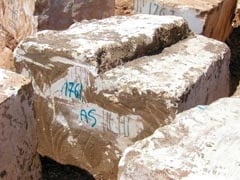Setting the standard : BS EN 1467:2012
It can be hard to keep up with all the standards for building products, especially as they frequently change. In this column, Barry Hunt throws some light on the standards, identifying those you need and those you don’t. This time he looks at the requirements for rough blocks.
The first standard I have chosen to review is BS EN 1467, which has recently been updated. It involves requirements for rough blocks of natural stone for use in building or commemoration.
It is an 18-page document priced when I looked at £96. The updated version is much the same as the previous version. If you already own the earlier version you may feel aggrieved if you buy the updated version.
In summary, the standard has about 11 useful pages of spaced out text (just under 3,000 words in total), a couple of basic figures and three tables which, as far as I could see, were of no great consequence.
Requirements that should be declared are the denomination of the block (as per EN 12440), a petrographic description (in accordance with EN 12407), apparent density and open porosity (to BS EN 1936) and flexural strength (following either EN 12372 or EN 13161).
The geometric characteristics required include shape, volume and mass. How to obtain them is given in EN 13373.
So what’s actually different about BS EN 1467:2012?
Well, it has some corrected English, a few sentences moved around, particularly the glossary items, a new and rather cryptic note at the bottom of the glossary regarding shapeless blocks and, in Section 4.2.2, it is advised that the GPS
co-ordinates for the location of the quarry may be used.
At a stretch, the pagination is slightly different. Oh, and it has a colourful front cover!
The major problem with this standard is that all the tests recommended for the block are going to be undertaken on the products that will be made from it, which appears to make it somewhat redundant.
I have really struggled to find any positive reason why anyone would want this standard, other than those few people who sell rough blocks rather than slabs, sawn stone or finished product.
Another galling aspect of this standard, and something that could be a recurring theme with these reviews, is the fact that much of the information is repeated in several other standards for natural stone products.
Very little effort seems to have gone into producing this standard, which makes the price even harder to justify.
Applying the standard in many real-life situations is a near impossibility as blocks are often piled high, part-buried, stacked close together, covered in dirt and with the bottom face never exposed for viewing.
Many block deals are undertaken with a handshake and the weights worked out by rules of thumb, say at the docks, and recompense given where materials are received that are discovered to be defective.
As utterly pointless standards go, this is right at the top. I can only give it a rating of one-out-of-ten. Using my own VFM (value-for-money) scale achieved by dividing the number of useful words by the price and multiplying by the rating gives a Barry Hunt VFM of 3%. Yes, this may seem a bit arbitrary, but I would rather have sent my £96 to charity – and gift aided it, too.
This is an example of where British Standards Institution (BSI) maybe should have a change of policy, so if you can prove you legitimately own a previous version of a standard you should receive the updated version free, or perhaps for a nominal charge.
However, as the BSI executives’ salaries are presently profit related, even though BSI is a chartered company with a non-profit sharing set up, I somehow doubt such an idea will be high on their agenda.
Reference: BS EN 1467:2012. Natural stone – Rough blocks – Requirements. Published by British Standards Institution, London.
Barry Hunt is a Chartered Geologist and Chartered Surveyor who has spent 20 years investigating issues relating to natural stone and other construction materials. He now runs IBIS, an independent geomaterials consultancy undertaking commissions worldwide to provide consultancy, inspection and testing advice. Tel: 020 8518 864.

